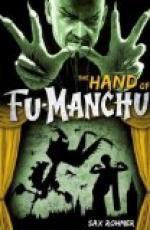I glanced at the chief officer of the Andaman, who sat in an armchair in our new chambers, contentedly smoking a black cheroot.
“Heaven has blessed me with a pair of useful hands!” said the seaman, grimly, extending his horny palms. “I’ve an old score against those yellow swine; poor George and I were twins.”
He referred to his brother who had been foully done to death by one of the creatures of Dr. Fu-Manchu.
“It beats me how Mr. Smith got on the track!” he added.
“Pure inspiration!” murmured Nayland Smith, glancing aside from the siphon wherewith he now was busy. “The divine afflatus—and the same whereby Petrie solved the Zagazig cryptogram!”
“But,” concluded Forsyth, “I am indebted to you for an opportunity of meeting the Chinese strangler, and sending him to join the Burmese knife expert!”
Such, then, were the episodes that led to the arrest of M. Samarkan, and my duty as narrator of these strange matters now bears me on to the morning when Nayland Smith was hastily summoned to the prison into which the villainous Greek had been cast.
We were shown immediately into the Governor’s room and were invited by that much disturbed official to be seated. The news which he had to impart was sufficiently startling.
Samarkan was dead.
“I have Warder Morrison’s statement here,” said Colonel Warrington, “if you will be good enough to read it——”
Nayland Smith rose abruptly, and began to pace up and down the little office. Through the open window I had a glimpse of a stooping figure in convict garb, engaged in liming the flower-beds of the prison Governor’s garden.
“I should like to see this Warder Morrison personally,” snapped my friend.
“Very good,” replied the Governor, pressing a bell-push placed close beside his table.
A man entered, to stand rigidly at attention just within the doorway.
“Send Morrison here,” ordered Colonel Warrington.
The man saluted and withdrew. As the door was reclosed, the Colonel sat drumming his fingers upon the table, Nayland Smith walked restlessly about tugging at the lobe of his ear, and I absently watched the convict gardener pursuing his toils. Shortly, sounded a rap at the door, and—
“Come in,” cried Colonel Warrington.
A man wearing warder’s uniform appeared, saluted the Governor, and stood glancing uneasily from the Colonel to Smith. The latter had now ceased his perambulations, and, one elbow resting upon the mantelpiece, was staring at Morrison—his penetrating gray eyes as hard as steel. Colonel Warrington twisted his chair around, fixing his monocle more closely in its place. He had the wiry white mustache and fiery red face of the old-style Anglo-Indian officer.
“Morrison,” he said, “Mr. Commissioner Nayland Smith has some questions to put to you.”
The man’s uneasiness palpably was growing by leaps and bounds. He was a tall and intelligent-looking fellow of military build, though spare for his height and of an unhealthy complexion. His eyes were curiously dull, and their pupils interested me, professionally, from the very moment of his entrance.




